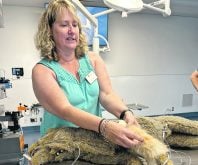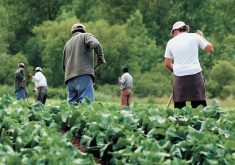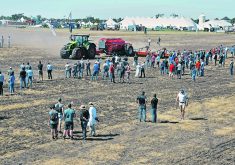Ron Krahn’s father, Abe, wanted to go for coffee with his neighbour, but he realized meeting in person wasn’t a good idea given the COVID-19 pandemic.
Instead, Abe and his neighbour met via truck. They each stayed in their passenger seats, rolling down their windows to talk to one another across the road.
They kept two metres apart, Ron said, following the advice from health officials to social distance.
“It’s a creative way to get together,” said Ron, who farms near Rivers, Man. “Otherwise, most of us have hunkered down at home with family. There’s not much of a social life.”
Read Also

Farming Smarter receives financial boost from Alberta government for potato research
Farming Smarter near Lethbridge got a boost to its research equipment, thanks to the Alberta government’s increase in funding for research associations.
The pandemic has caused many people like Ron in rural communities to adjust their lives.
Parents are establishing new routines as kids return home from school. Families have postponed meeting with friends and grandparents. Fridges, freezers and pantries have been stocked.
For farmers, new protocols have been set up at elevators and suppliers to ensure minimal contact. As a result, some lineups have become longer.
In town, many small businesses have partially or fully closed, causing them to lay off employees. Main streets are quieter.
For many, it’s created feelings of uncertainty for the future.
“It’s just a weird situation,” said John Guelly, who farms near Westlock, Alta., and is the chair of the Alberta Canola Producers Commission.
“We don’t know what’s coming next or what to prepare for, or what the next shortage might be,” he said.
Al Kemmere, president of the Rural Municipalities of Alberta, said despite challenges, people in the transportation and food industry are working to ensure rural communities have food and supplies.
He said while store shelves might not be as stocked as normal, he has heard of no one going hungry.
“It’s a little scary but, at the same time, we have to work together as a community to minimize the risk as much as we can,” he said.
For farmers, it appears seeding plans have remained the same. Calving has also been underway.
Many have said they’ve managed to get supplies. They hope they won’t run into issues in the coming weeks.

“It’s manageable right now, but still concerning,” said Roger Chevraux, who farms near Killam, Alta., and is a director with the Alberta Canola Producers Commission.
“Everything will have to be on time, all in a short window,” he said. “If one of those cogs gets broken or we don’t have enough truck drivers or production facilities, we will be in serious trouble.”
Guelly said an owner of an auto parts store in town has let all his staff go. The owner has been doing far fewer invoices during the pandemic, he said.
Scott Bolton, president and chief executive officer of United Farmers of Alberta Co-operative, said stores remain open and haven’t laid off staff.
He said UFA stores are an essential service. It’s operating business as close to normal while ensuring employees and customers are healthy and safe, he said.
Bolton said the supply chain remains strong, even though it has been under some strain. He believes the supply chain will hold up.
“I share and understand some of that anxiety, but I’m confident we are going to supply what they are going to need,” he said.
“It’s important that the supply chain in agriculture be designated as essential across the world. It would protect the supply chain and allow farmers to plant crops. It’s as fundamental as it gets.”
But for other small town businesses, like cafes and restaurants, many are holding on by a thread.
Herman Bergen, who owns Country Grill Steak & Ribs in La Crete, Alta., said he’s had to lay off some employees. He has been trying to do more deliveries, as well as advertise on social media, but there is lots of uncertainty, he said.
He said he wants the local county to waive or reduce property taxes, and he acknowledged the provincial and federal governments have brought forward plans that aim to help people and small businesses.
Ivy Bochon Duffy, who owns Moonshine Cafe in Tofield, Alta., said business has been slow. The cafe has largely closed, but has offered deliveries to customers two days a week.
She said she hopes everyone does their part to keep a safe distance from one another and not congregate in large groups.
“This is a community with lots of older people,” she said. “I’m doing my part to keep everyone healthy. There is going to be help from the government, and that’s a good thing. We are lucky we live here.”
Market garden producers are hoping farmers markets are declared essential so they can run throughout the summer. For many, the markets are crucial for their businesses.

Denis Forstbauer, who farms vegetables and greens near Armena, Alta., said seeding plans remain the same.
The farm runs a community-supported agriculture program, so it’s been figuring out if it will still be possible for people to work garden shifts on the farm. As well, it may have to re-coordinate drop-off spots for customers.
“The biggest thing we are trying to figure out is how we can get our food safely to people without having contamination,” he said.
At home, the Forstbauers have been getting their kids into a new routine now that schools have closed. They’ve been talking about the importance of social distancing, doing puzzles and having virtual playdates with friends.
He said the pandemic provides an opportunity for farmers to spread awareness about the value of food and farming.
“It’s something that’s going to be prominent and more relevant now than ever before,” he said.


















